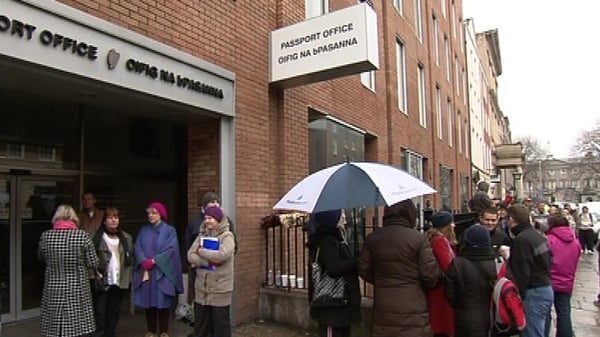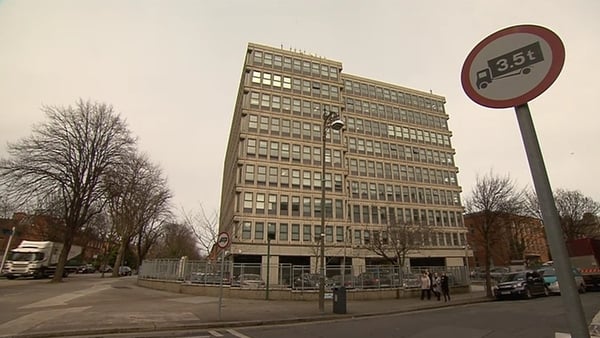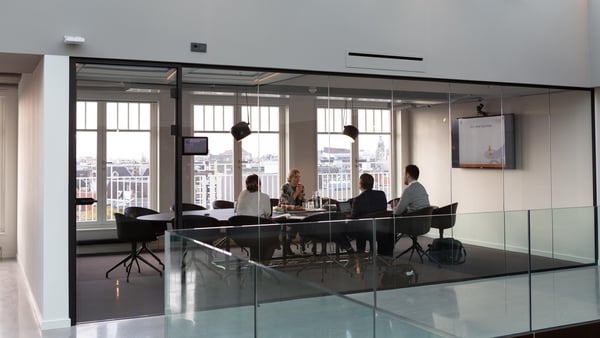Analysis: both employer and employee have a legal duty to take reasonable care to ensure health and safety in the workplace
With the easing of Covid restrictions, the remaining cohort of those working remotely at home have been gradually returning to their physical workplace since September. However, the pandemic is still prevalent and, as we adjust to the new reality of living in a Covid world, the risk of being exposed to and potentially getting Covid-19 remains, especially as we interact and meet with more people on a daily basis.
While we can choose to limit our social outings and interactions, we do have to go to work. Therefore, there is a very real possibility that you might be a close contact of a colleague who tests positive for Covid-19, or in the worst case scenario, you end up catching Covid from a colleague at work. If this happens what rights, if any, do you have?
We need your consent to load this rte-player contentWe use rte-player to manage extra content that can set cookies on your device and collect data about your activity. Please review their details and accept them to load the content.Manage Preferences
From RTÉ Radio 1's Today with Claire Byrne, employment law solicitor Richard Grogan on returning to work
In line with Government guidance, anyone suspected of having Covid symptoms is advised not to attend work and to self-isolate for the required quarantine period. The primary concern for many people then would be taking time off work due to illness and if you have a right to be paid for this period of sick leave. Whether or not you are eligible for sick pay from your employer is very much dependent on the terms and conditions of your individual contract of employment, and any sick leave pay policy that may exist in your workplace.
However, there is no statutory obligation currently for employers to include sick pay as part of a contract of employment, though this is due to change in 2022. In that scenario, where the employer does not provide sick pay and you are required to take time off work either because you are ill with Covid-19, or in circumstances where you have been medically certified to self-isolate as a close contact of someone diagnosed as Covid positive, you can apply for the Covid-19 enhanced illness benefit payment which is €350 per week (this payment is available for both employees and the self-employed and is due to remain in place until next February). There are different time limits for this payment, so if you are diagnosed with Covid-19, you will receive the payment for a maximum of ten weeks. If you are required to self-isolate, the payment will be for a maximum of two weeks.
Employer's liability
Another question arises as to if it would be possible to sue your employer if you believe that you caught Covid-19 from a colleague. In the unfortunate situation that they seemingly catch Covid-19 from someone in the workplace, it would be difficult for a worker to successfully sue their employer. We are still learning about the transmission of Covid-19. The reality is that we could be infected before any symptoms appear. Some people can be completely asymptomatic but infectious and therefore capable of spreading Covid-19. All of this makes it very challenging to prove that you acquired the Covid-19 infection solely in the workplace due to direct contact with your colleague.
We need your consent to load this rte-player contentWe use rte-player to manage extra content that can set cookies on your device and collect data about your activity. Please review their details and accept them to load the content.Manage Preferences
From RTÉ Radio 1's Drivetime, Caroline Reidy from the HR Suite and Neil McDonnell from ISME on the consequences for companies who insist on mandatory vaccination
Employers have both a statutory and common law duty to ensure safety, health and welfare in the workplace. To claim that your employer was liable for you catching Covid-19 under common law, you would have to prove that the employer was in breach of their duty of care to ensure your safety, health and welfare at work, and that this breach caused you harm. An employer could defend a claim for negligence by showing that they have taken reasonable steps to mitigate any risks relating to exposure to Covid-19. What constitutes reasonable steps can vary depending on the particular workplace environment, as well as any Covid-19 restrictions or Government guidelines in place at that time.
The Safety, Health and Welfare at Work Act 2005 imposes an obligation on employers to ensure so far as is reasonably practicable the safety, health and welfare at work of their employees. Essentially, this statutory duty requires employers to ensure that they take the necessary precautions to prevent and reduce the spread of Covid-19.
Furthermore, employers are also required to take into account the relevant Government and public health guidelines on measures to facilitate the safe return to work. Employers are responsible for risk assessment and where risks are identified to take steps to mitigate those risks. Based on current guidance, employers are not permitted to require employees to get a vaccine and vaccination cannot be a condition for returning to the office, or a requirement for employment. Moreover employers cannot ask if employees are vaccinated.
We need your consent to load this rte-player contentWe use rte-player to manage extra content that can set cookies on your device and collect data about your activity. Please review their details and accept them to load the content.Manage Preferences
From RTÉ Radio 1's Drivetime, Neil McDonnell from ISME and Julie Galbraith from Eversheds Sutherland on whether employers should have the right to know if employees have been vaccinated against Covid-19
In accordance with the Work Safely Protocol - Covid-19 National Protocol for Employers and Workers, many workplaces have adapted systems of work in an effort to manage any potential risks, including changes to open plan office spaces (perhaps with a reduction in the numbers of staff who can be present at any one time; use of dividers between desks; adherence to mask wearing indoors), improvements to ventilation systems, provision of hand sanitising stations, contact tracing, social distancing etc. Employers are obliged to ensure that at the very least the minimum public health requirements are in place to prevent and reduce the spread of coronavirus in the workplace.
Employers who take all reasonably practicable measures, and comply with the public health requirements would be able to defend any potential claims of liability. However, you would have a good reason to claim that the employer is in breach of their statutory and common law duties to safeguard your safety, health and welfare at work if the employer failed to implement the minimum public health requirements.
It is also worth noting that the onus and responsibility for health and safety in the workplace does not rest solely with the employer. Employees also have a legal duty to take reasonable care to ensure their health and safety in the workplace. This responsibility would require employees to comply with the minimum Public Health infection prevention and control measures which have been introduced to prevent and reduce the spread of Covid-19. An employee’s failure to adhere to the applicable Covid rules and regulations in the workplace could negate any potential legal claim, especially if the employer has taken all reasonably practicable measures to enable a safe return to work.
The views expressed here are those of the author and do not represent or reflect the views of RTÉ






